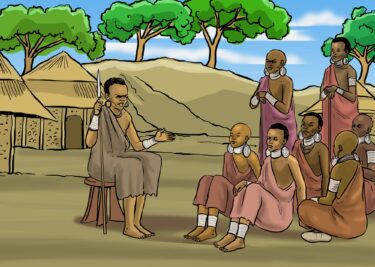#KeFestivals: Lamu Cultural Festival

The alluring sounds of Taarab music float on the air, the sound of the tide wafting along with it. Hundreds of people are gathered for a celebration of Swahili culture at the Lamu Cultural Festival, which takes place on Lamu Island. The calm atmosphere and soft buzz of excitement create the perfect environment for the healthy expression of culture through competition.
When it comes to strategy and skill, few games compare to Bao. Though more obscure than chess or other strategy boardgames, it is one of the oldest games in the world. Using a few stones and a surface with shallow pits in it, the aim of the game is to have the most stones in your “bank” at the end. During the festival, Lamu streets are full of people hunched over beautifully made bao boards; these matches are just one highlight of the competitive spirit of the island.
Though unlike Bao, you cannot find a better display of teamwork than that on a football pitch. And at the festival, locals take their football seriously. Tournaments are played both officially and in a more informal setting, at the beach. These games encourage a friendly rivalry and the rush of adrenaline as players try to score for their respective teams. Conservation efforts are nurtured through the fishing competitions at the festival. After all, the activity of the day means, after a while, there will be many famished attendees seeking Swahili cuisine.
The most important competitions, however, are the festival’s iconic donkey race and the dhow race. For the land race, people begin training months ahead of the event. The island is no place for cars and during this event, people bring their best animals out. Making sure they can get their normally stubborn creatures into submission, they approach the start-line, determined to win the race.
The dhow race also sees its fair share of competition. The objective of the game is to be the first boat to pass under the finish line, which is set out at sea. As the boats with their impossibly tall masts and off-white sails wave in the sea breeze, the people cheer the teams on. Experience counts for much as the dhow race includes various obstacles to increase the level of difficulty. As the sailors glide over the waves in their boats that have been prepared for this very moment, the spectators watch on and place bets on which dhow will win.
Where culture comes into play, Lamu’s culinary delights, music, and dance are arrayed for appreciation. Restaurants around the island afford everyone an opportunity to get a literal taste of Lamu. Maybe, even that fish that was captured earlier will feature in a skillfully spiced dish. Traditional dances, named Uta, Kirumbizi, and Shaubani, are performed by those whose families have passed down the technique of these dances to them. Performing acts lend their voices to the festival and acrobats perform mind-bending feats for festival-goers.
The town invites those at the festival to explore all the historic sites on Lamu. From the Lamu Old Town, which is a UNESCO World Heritage Site, to the stunning beaches, all one needs to participate in the festival is a place to stay. The beachfront buildings that overlook the Indian Ocean afford visitors with a breathtaking and serene view in between the exciting events of the festival. However, accommodation fills up fast, and if you intend to travel for the Lamu Cultural Festival, you need to book everything at least two months in advance. The festival is open to the public, running for 3-4 days.
If fun competition, community, history and travel are your delight, the Lamu Cultural Festival is the place to be this November.






